Michael Lynch Distinguished Lecturer Series
This visitor series invites a prominent scholar within the fields of queer, feminist, and sexuality studies to give a guest lecture that is free to the public.
2024: Oceanic Sex: Archives of Caste and Indenture with Anjali Arondekar
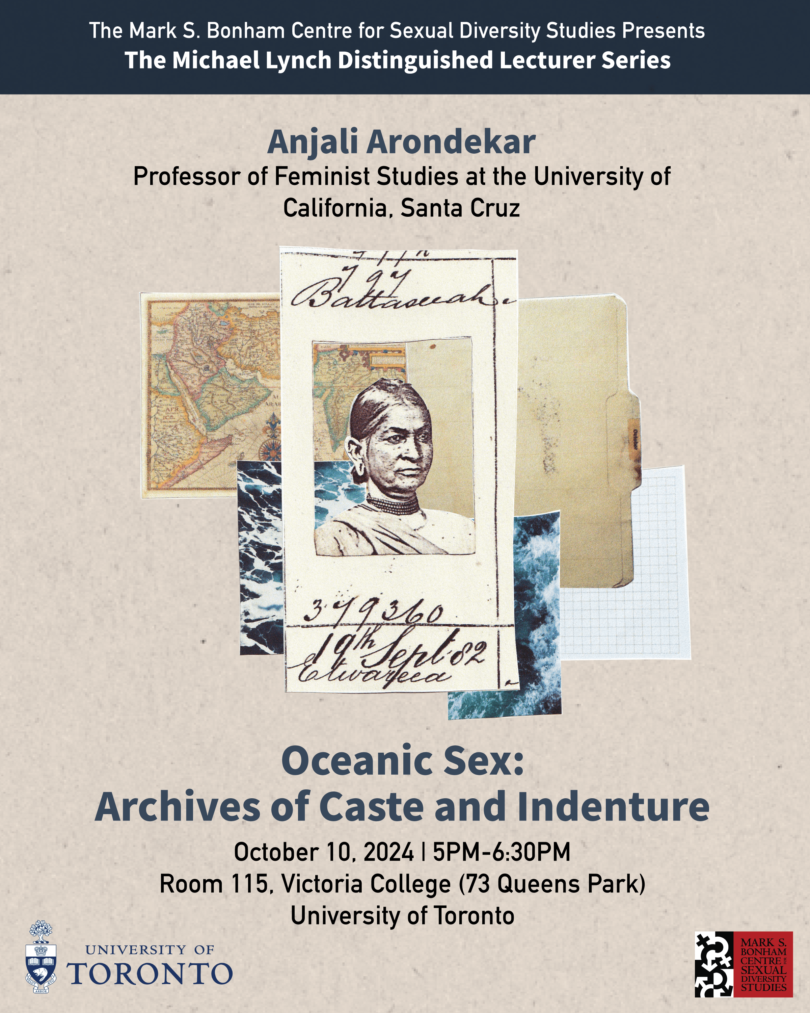
Anjali Arondekar is Peggy and Jack Baskin Foundation Presidential Professor of Feminist Studies. She was the founding Director, Center for South Asian Studies, University of California, Santa Cruz, 2020-24. Her research engages the comparative poetics and politics of sexuality, caste, and historiography, with a focus on Indian Ocean Studies and South Asia. She is the author of For the Record: On Sexuality and the Colonial Archive in India (Duke University Press, 2009, Orient Blackswan, India, 2010), winner of the Alan Bray Memorial Book Award for best book in lesbian, gay, or queer studies in literature and cultural studies, Modern Language Association (MLA), 2010. She is co-editor (with Geeta Patel) of “Area Impossible: The Geopolitics of Queer Studies,” GLQ: A Journal of Lesbian and Gay Studies (2016), and (with Sherene Seikaly) of “Pandemic Histories,” History of the Present (2022). Her second book, Abundance: Sexuality’s History (Duke University Press, 2023, Orient Blackswan, 2023), grows out of her interest in the archival figurations of sexuality, caste and historiography in British and Portuguese colonial India. Arondekar is currently working on a third project, tentatively entitled, Oceanic Sex: Archives of Caste and Indenture, that couples the archival forms of indenture with the oceanic voyages of caste and sexuality.
Archive
2022: How She Goes Mad without Losing Her Mind: A Portrait of the Artist as a Mad Black Woman with La Marr Jurelle Bruce
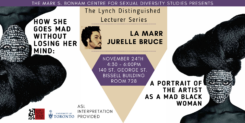
How She Goes Mad without Losing Her Mind: A Portrait of the Artist as a Mad Black Woman with La Marr Jurelle Bruce
Abstract: This lecture will be a meditation on madness in the works and worlds of Mamie Smith, Toni Morrison, Nina Simone, Ntozake Shange, Gayl Jones, and Lauryn Hill.
La Marr Jurelle Bruce (B.A. Columbia, Ph.D. Yale) is an interdisciplinary humanities scholar, cultural critic and theorist, Black/black studies devotee, first-generation college graduate, and Associate Professor of American Studies at the University of Maryland, College Park. The recipient of fellowships and prizes from the Ford Foundation, Mellon Foundation, and Modern Language Association, Bruce studies black expressive cultures—especially literature, music, film, and the art and aesthetics of quotidian black life. His writings appear in such venues as American Quarterly, The Black Scholar, GLQ, Social Text, TDR, and African American Review, for which he won the Joe Weixlmann Prize for Best Essay. His debut book, How to Go Mad without Losing Your Mind: Madness and Black Radical Creativity, earned the Nicolás Cristóbal Guillén Batista Outstanding Book Award. Now he’s in the thick of a project on—and experiment in—convergences of love and madness. He sometimes calls it The Afromantic.
2021: Suture: Notes on Method, Keguro Macharia in conversation with Deb Cowen and Nikoli Attai
Suture: Notes on Method, Keguro Macharia in conversation with Deb Cowen and Nikoli Attai
The Bonham Centre for Sexual Diversity Studies at the University of Toronto held its annual Lynch Distinguished Lecturer Series with guest speaker Keguro Macharia in conversation with Deb Cowen and Nikoli Attai. “Suture: Notes On Method” took place on Zoom on October 21.
keywords: repair, invention, Black Diaspora
Suture names a strategy to work across difference. To hold two or more things and to deliberately craft relation. Not presuming that relation should exist or that there is even one way relation should work. But to invent the strategies needed to craft ongoing relation. To see the work and the craft and the seam and the scar. Suture sits in my mouth as quotidian repair. I want to think about repair not as the effect of devastation, though we cannot escape devastation, but as what sustains a quotidian we want to make and inhabit. Suture sits in my mouth as a technology that I am moving into metaphor, even as I want to hold on to flesh. Suture might name what is held through acts of invention. In this meditation, I sit with Audre Lorde’s practice of working across difference and ask how suture, as invention and repair, maps Black women’s aesthetic practices.
Bios:
Keguro Macharia is an independent scholar from Nairobi, Kenya. Macharia’s scholarship explores the relation between difference and freedom across the Black Diaspora, focusing specifically on the seam between Africa and the Black Diaspora. Macharia is the author of Frottage: Frictions of Intimacy across the Black Diaspora (NYU Press, 2019).
Deb Cowen is Professor in the Department of Geography & Planning at the University of Toronto. Her work explores how the spaces of everyday life are assembled, reproduced, contested, and transformed. She focuses on questions of circulation and infrastructure, attending to the co-production of race and space, sexuality and social ordering, and the intimate life of war in ostensibly civilian spaces. She is the author of Military Workfare: The Soldier and Social Citizenship in Canada. (University of Toronto Press, 2008); The Deadly Life of Logistics: Mapping Violence in Global Trade. (University of Minnesota Press, 2014); co-editor of War, Citizenship, Territory. Routledge (2008); and co-author of ) Reassembling the Infrastructures of Citizenship: Digital Life in the Global City. (UBC Press, 2020). Her current research, entitled, Spineless: Infrastructure for the Apocalypse, explores the key role of socio-technical systems in the colonization of North America, and unearths alternative visions and forms of infrastructure to reorient us on a path to survival, justice and flourishing.
Nikoli Attai completed a collaborative PhD in Women and Gender Studies and Sexual Diversity Studies at the University of Toronto in 2019. From 2020-2021, he served as the Provost’s Postdoctoral Fellow. He is currently working on his first book manuscript titled Queer Liberation? Interrogating Human Rights Activism and the Queer Caribbean, which interrogates the work being done by activists and non-governmental organizations in the Anglophone Caribbean and Toronto, Canada, and theorizes that current queer human rights interventions fail to adequately address the deeply complicated ways that queer people negotiate and resist homophobia, transphobia, and discrimination in the region. His research and teaching focus on Black queer studies, transnational feminism, transgender studies, and transnational sexuality studies, with a particular focus on the Global South.
2020: The Unfinished Business of Cruel Optimism: Crisis, Affect, Sentimentality, Lauren Berlant in conversation with Rebecca Wanzo and Dana Luciano
The Unfinished Business of Cruel Optimism: Crisis, Affect, Sentimentality, Lauren Berlant in conversation with Rebecca Wanzo and Dana Luciano
“I have not had the emotional, or even intellectual, capacity to write about Lauren Berlant since her death. I feel the grief—sharp but also ineffable—but no words emerge in coherent narrative form. Memories float by, mental images, sentence fragments. In 1993, she told me I didn’t have a robust enough understanding of homosociality, in 1996 we stood over her stove roasting red peppers together, sometime in the early 2000s we had a heated discussion about South Park. in 2020, when Ruth Bader Ginsburg died, she texted me with a single word (“sob”). Like that. But mostly it is just the indescribable (for me) feeling of loss. How do you write about someone who was your teacher, mentor, and dear friend for over two decades? The interpersonal joys and struggles, the sense of accomplishment and failure (oh the feeling of failure!), the laughter and the arguments. Others have done so beautifully, and I am grateful for that.
We knew at the time that it was very likely to be her last public talk in which she could share her new work on The Inconvenience of Other People. And so we talked a lot about what form she wanted that to take. As was usual for her, she wanted it to happen in dialogue with other people, to connect and show up and build with friends, and so we asked Dana Luciano and Rebecca Wanzo to be part of the conversation. What emerged was a moving exchange about feeling, fantasy, the historical present, being in relation, and so much more.”
- Dana Seitler, Director of the Mark S. Bonham Centre for Sexual Diversity Studies
Lauren Berlant was the George M. Pullman Distinguished Service Professor of English at the University of Chicago. She was the author of The Anatomy of National Fantasy (University of Chicago Press 1991), The Queen of America Goes to Washington City (Duke UP 1997), The Female Complaint: The Unfinished Business of Sentimentality in American Culture (Duke 2008), Cruel Optimism (Duke UP, 2011), Sex, or the Unbearable with Lee Edelman (Duke UP, 2014), The Hundreds with Kathleen Stewart (Duke UP, 2017), and Desire/Love (Punctum, 2012).
Rebecca Wanzo is Professor and Chair of Women, Gender, and Sexuality Studies at Washington University, St. Louis. She is the author of The Suffering Will Not Be Televised: African American Women and Sentimental Political Storytelling (SUNY Press 2009) and The Content of Our Caricature: African American Comic Art and Political Belonging (NYU Press, 2020).
Dana Luciano is Associate Professor in the departments of English and Women’s & Gender Studies at Rutgers University. She is the author of Arranging Grief: Sacred Time and the Body in Nineteenth-Century America (NYU, 2007), the edited volumes “Queer Inhumanisms,” a special issue of GLQ: The Journal of Gay and Lesbian Studies, co-edited with Mel Y. Chen (vol. 22 no. 2-3, spring/summer 2015) and Unsettled States: Nineteenth-Century American Literary Studies (NYU Press, 2014), co-edited with Ivy G. Wilson. Luciano is currently at work on the book project How the Earth Feels: Geological Fantasy in the Nineteenth-Century US.
2020: Lost in Transposition, or Karaoke for White Men with Karen Tongson
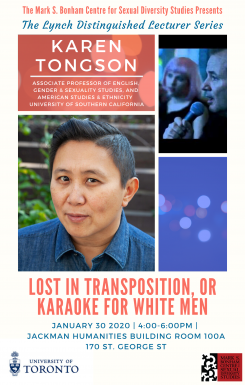
Lost in Transposition, or Karaoke for White Men with Karen Tongson
In recent decades, a narrative about karaoke has emerged in the broader cultural discourse that replicates what we’ve seen karaoke accomplish onscreen since the films Duets (2000) and Sofia Lost in Translation (2003). Karaoke has reassured white, mostly middle-aged heterosexual men that they, too, can love again, and truly live again despite suffering numerous heartbreaks and other devastating losses, not only of their beloveds, but more significantly, of themselves in the age of late capitalism. As Tongson argues in this presentation, these journeys through, if not actually towards sentimentality–these scripted yet sincere narratives of white-hetero-male-redemption in movies and books–are among the reasons karaoke has achieved such an astounding level of popularity, while earning contingent forms of mainstream acceptance in the United States since the turn of the millennium.
2019: Brown Jouissance, Molecular Intimacies, and Kara Walker’s A Subtlety with Amber Musser
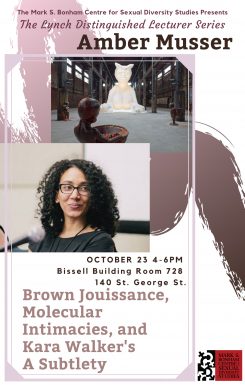
Brown Jouissance, Molecular Intimacies, and Kara Walker’s A Subtlety with Amber Musser
The talk uses Kara Walker’s 2014 installation “A Subtlety or the Marvelous Sugar Baby” to delve into the different representational politics surrounding race and sexuality. In contrast to sexuality, race is often framed as visually knowable, but this means that we are left to grapple with distinct epistemological approaches toward violence, vulnerability, and pleasure. In order to make sense of the incommensurate, the talk offers brown jouissance and the process of molecularization as an analytic that centers oscillations between object/self/Thing and sensation as a mode of reading the aesthetic.
2018: Queer Temporality in Melville’s “Bartleby the Scrivener” and Gertrude Stein’s “Melanctha” with Elizabeth Freeman
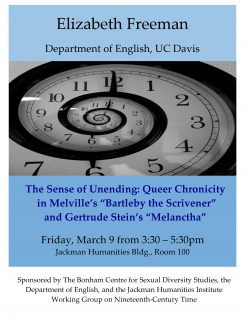
Queer Temporality in Melville’s “Bartleby the Scrivener” and Gertrude Stein’s “Melanctha” with Elizabeth Freeman
2017: Confessions of the Fox Reading with Jordy Rosenberg

Confessions of the Fox Reading with Jordy Rosenberg
A love story set in the eighteenth-century London of notorious thieves and queer subcultures, this genre-bending debut tells a profound story of gender, desire, and liberation.
Confessions of the Fox is, at once, a work of speculative historical fiction, a soaring love story, a puzzling mystery, an electrifying tale of adventure and suspense, and an unabashed celebration of sex and sexuality. Writing with the narrative mastery of Sarah Waters and the playful imagination of Nabokov, Jordy Rosenberg is an audacious storyteller of extraordinary talent.
“I devoured this book because of its Dickensian devotion to gnarly historical steam punk realism. Really it’s such an obsessive read, sad it was over. I couldn’t stop wanting to go there.”—Eileen Myles, author of Chelsea Girls
Jordy Rosenberg is a transgender writer and scholar. He is an associate professor at the University of Massachusetts Amherst, where he teaches eighteenth-century literature and queer/trans theory.

